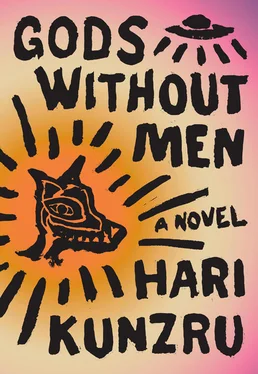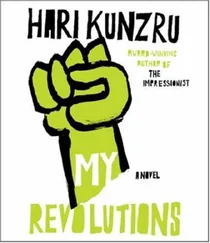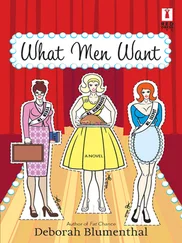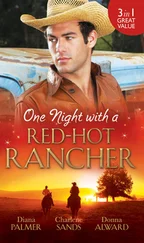He watched TV until the sun went down and he felt safe enough to walk out behind the motel and look for a place to drop the gun. A big fuck-off gold pistol. It would have to be the flashiest cunt of a gun in the whole world. He knew he ought to drive somewhere farther off, but was scared he’d get pulled over. He stood out in the open for a long time, feeling the last of the heat radiating out of the sand and listening to the distant sound of rotors. Some miles away, a helicopter was directing a floodlight at the ground. He watched it hover, a matchstick of light.
In the end he just walked back to the room and switched on the TV. All evening there were comings and goings outside. Voices, car engines, the crackle of police radios. He could still remember, very distinctly, the pressure of the little boy’s hand gripping his.
He was woken early the next morning by a loud rap on the door. He struggled into his jeans and squinted through the spyhole. It wasn’t a cop. Some guy in a suit and tie. The guy kept knocking for a while, then gave up. Nicky took a shower, dressed and checked the spyhole. No one there. When he stepped outside he saw Suit and Tie just down the block. Behind him stood another guy with a video camera.
He shut the door quietly and walked off as quickly as he could without breaking into a run, skirting the pool so as not to draw their attention. Suddenly the office door clattered open and the manager came running out of the office.
“Get off my property. Go on. Right now. You’re trespassing. You’re not guests of the motel and you didn’t sign in, so get the hell out of here.”
“Ma’am,” said Suit and Tie, “we’re just trying to do our job. We’d be happy to get your point of view also.”
Dawn told them to leave her customers alone and Suit and Tie said something about the First Amendment and Nicky tiptoed round the corner to find that the whole front lot was full of cars. There were police vehicles and outside-broadcast vans and station wagons full of local teens hoping to see some action. Cops were drinking coffee out of Styrofoam cups. News presenters were climbing on boxes to get the motel sign in frame. There was a peculiar carnival atmosphere.
He heard his name being called and turned to find a boy ambling towards him. Seventeen, maybe. White-framed dark glasses and directional hair.
“Nicky Capaldi? I blog at Sounds West . What are you doing here?”
“I’m trying to get some breakfast.”
“Are you something to do with the missing kid? I mean, like a relative or something?”
“What are you on about? Shit, my car’s boxed in.”
“Well, it seems like too much of a coincidence that you’re here, like, with this kidnapping going on? I mean, are you here to do a televised appeal?”
“What have you heard?”
“Just that there’s this kid and he’s missing?”
In his peripheral vision, Nicky saw Deputy Sheriff Loosemore. Apparently the blogger was even more unnerved than he was; he immediately made himself scarce. The sheriff leaned against the nearest Crown Victoria and looked him up and down. A few teenagers sidled closer, taking pictures of them talking.
“Deputy Alvarez said you were famous.”
“Any news on the kid?”
“None. We got every available man out looking, so any leads would be appreciated. You met the boy. I’m sure you understand.”
He gestured towards his car, like a salesman. Nicky got in and tried to look nonchalant for the kids sticking their phones up to the passenger window.
“Looks like you’re a regular pied piper to the young folk,” said Loosemore, dropping the sentence onto Nicky’s lap like a rattlesnake. They drove in silence to the station, where in a small act of mercy Nicky was given a coffee and a rubbery Danish which gave him a momentary sugar rush he mistook for optimism. In an interview room, with a tape recorder running, he told the story. The kid running into his room, the trip to Burger King, the chitchat with Jaz. So why had he got up so late? Where had he been during the day? He told the sheriff about the kids at the thrift store, the argument with the waitress at the diner. The interrogation went on and on. In a break, he said he needed to go to the loo, locked himself in a cubicle and phoned Terry.
“Where the hell are you, Nicky?”
“Come and get me.”
“Where are you?”
“Just fucking come, right now.”
“Nicky, listen to me. Are you OK?”
“No. I’m in a cop shop. You’ve got to come and get me.”
“Have they arrested you? Did you get arrested? It says on the Internet you kidnapped a kid.”
“It says I did what?”
“You didn’t do it, right?”
“Who says? Who says I did?”
“Nicky, you need to get yourself together.”
“How did this even happen to me? Right now, Terry. Come. I mean it.”
The Indian was up on the rocks. He must have watched them riding across the salt flat and decided to make a stand. When the posse men started to climb, he fired a couple of rounds, sending them squirming on their bellies for cover. They came back down, cursing. He couldn’t last forever. Food, ammunition or water: One of them would run short. Then it’d just be a question of who’d go up and get him. Until then, they’d have to sit and wait him out.
Deighton looked up at the sky. Though it wasn’t yet nine in the morning, the light was fierce. It fell on his head like a curse, a reminder of the guilt he bore. Without him and the lie he told, there would be no manhunt. He knew he ought to put a stop to it, to tell them he’d made a mistake, suffered a hallucination — whatever it would take. But they weren’t going to listen. The professor, the Boston Brahmin. Out here he was the lowest of the low, the lowest a white man could be.
He knew the place. That was what scared him most. Not by sight. From the last story Eliza had transcribed. You must travel to the Three-Finger Rocks and look inside the cave beneath them. There you will find Yucca Woman, weaving a basket . It was where the old Spanish friar had gone, during his missing days. She is weaving together this world and the Land of the Dead . It was the secret place, the womb of the mystery.
Death was in the sky, in the bone light hurting his eyes. Death was coursing through the sand under his feet.
He could taste it in his mouth.
He wasn’t even sure what he’d seen. But if he’d invented it, if it was some fragment of his unconscious mind, he should have been able to explain. A perception in the absence of a stimulus. A trick of his war-disordered brain.
It had begun in the Indian camp at Kairo, when he drove out to check Eliza’s work. She was sullen, as she usually was when he drew attention to her habitual sloppiness. He’d taught her his method of notation, and in the field she’d learned the value of rigor when checking grammar and pronunciation, yet she persisted in making elementary mistakes. He had every right to speak sharply. If there were to be any record of the desert Indian culture, it would have to be made now. The Indians were dying out. They were already impure, both culturally and in terms of blood. Take the informant, this Willie Prince. He admitted to a white grandparent. He’d grown up at least partly in a civilized context and had huge gaps in his tribal knowledge. And he was one of the more useful ones. There were at least two people in the camp who appeared to have some level of Negroid admixture. They were all far from pristine.
Unexpectedly, Eliza started to cry. He told her not to behave like a child. She’d known what marriage would entail. It wasn’t as if he’d sugarcoated the thing. He’d made clear when he proposed that if she didn’t feel she was cut out for the work, she should go back to New York and find herself some schoolteacher. She’d sworn she loved him. Still, she was a woman, and he had the impression she expected to be coddled. When he first left her out at Kairo, she’d utterly failed to see the logic. The two of them could gather twice as much material if they worked separately. Of course there was a certain amount of discomfort involved, but her objections were grounded in selfishness.
Читать дальше












